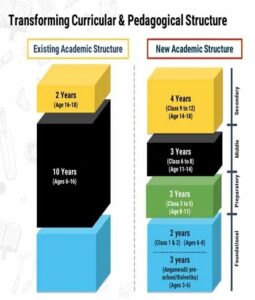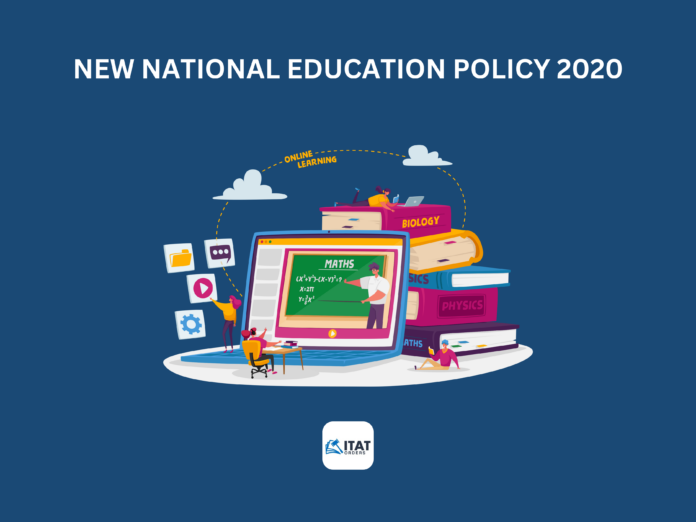Important News: The Union Cabinet renamed the Ministry of Human Resource Development to the Ministry of Education. Making the announcement, Union Ministers Prakash Javadekar and Ramesh Pokhriyal Nishank said there would be a single regulator for all higher education institutions and MPhil would be discontinued. In a bid to ramp up digital learning, a National Educational Technology Forum (NETF) would be created.
What is New National Education Policy?
A National Education Policy or NEP is a comprehensive framework to guide the development of education in the country.
[History: A new NEP usually comes along every few decades. India has had three to date. The first came in 1968 and the second in 1986, under Indira Gandhi and Rajiv Gandhi respectively; the NEP of 1986 was revised in 1992 when P V Narasimha Rao was Prime Minister. The third is the NEP released Wednesday under the Prime Ministership of Narendra Modi.]
Recent Changes in Educational Policy:
- In school education, the policy focuses on overhauling the curriculum, “easier” Board exams, a reduction in the syllabus to retain “core essentials” and thrust on “experiential learning and critical thinking”.
- In a significant shift from the 1986 policy, which pushed for a 10+2 structure of school education, the new NEP pitches for a “5+3+3+4” design corresponding to the age groups 3-8 years (foundational stage), 8-11 (preparatory), 11-14 (middle), and 14-18 (secondary). This brings early childhood education (also known as pre-school education for children of ages 3 to 5) under the ambit of formal schooling. The mid-day meal programme will be extended to pre-school children. The NEP says students until Class 5 should be taught in their mother tongue or regional language.
- The new national education policy 2020 also proposes phasing out of all institutions offering single streams and that all universities and colleges must aim to become multidisciplinary by 2040.

The curricular and pedagogical structure and the curricular framework for school education will therefore be guided by a 5+3+3+4 design, consisting of the Foundational Stage (in two parts, that is, 3 years of Anganwadi/ Pre-school + 2 years in primary school in Grades 1-2; both together covering ages 3-8),
- Preparatory Stage (Grades 3-5, covering ages 8-11),
- Middle Stage (Grades 6-8, covering ages 11-14), and
- Secondary Stage (Grades 9-12 in two phases, i.e., 9 and 10 in the first and 11 and 12 in the second.
For Board Examinations:
While the Board exams for Grades 10 and 12 will be continued, the existing system of Board and entrance examinations shall be reformed to eliminate the need for undertaking coaching classes.
To reverse these harmful effects of the current assessment system, Board exams will be redesigned to encourage holistic development; students will be able to choose many of the subjects in which they take Board exams, depending on their individualized interests.
Board exams will also be made ‘easier’, in the sense that they will test primarily core capacities/competencies rather than months of coaching and memorization; any student who has been going to and making a basic effort in a school class will be able to pass and do well in the corresponding subject Board Exam without much additional effort.
To further eliminate the ‘high stakes’ aspect of Board Exams, all students will be allowed to take Board Exams on up to two occasions during any given school year, one main examination and one for improvement, if desired.
For Students with Innate Talents:
The National Scholarship Portal will be expanded to support, foster, and track the progress of students receiving scholarships. Private HEIs will be encouraged to offer larger numbers of free ships and scholarships to their students.

For Graduation Degree:
Now, in the new policy, there will be a 4 year course and for every year passed, one will receive a certificate which can be regarded as a qualification and also there is an inclusion of re-entry meaning if by whatsoever reason, one discontinues education from year 1 or 2 or 3, s/he can re-enter the next year after whatsoever time instead of re-starting from year 1.
With the removal of B.com, B.Sc., B.A. etc., a student will receive graduate certificate on completion of Year 1, Graduate Diploma on completion of Year 2, Graduate Degree on completion of Year 3 (i.e. if a job specification in general requires a Graduate as a qualification for a job application, the student must have completed 3 years of education post Std. 12 and received the Graduate Degree), and if the student completes 4th Year, then s/he receives Graduate in Research.
For Post-Graduation:
Post-Graduation is now in 1 or 2 years course (provided PG can be applied for on completion of at least 3 years of Graduation Course) which means that if a student has completed all 4 years of Graduation Course then s/he can complete Post Graduation in just 1 year; while if a student has completed only 3 years course, then he has to undertake PG course of 2 years; meaning PG is received after completion of 5 years of Graduation as well as PG.
Note: M.Phil course has been removed but PhD. is still part of the policy with a 4 year course to achieve PhD.
New Inclusions in the National education policy 2020:
-
With the implementation of New National Education Policy, the top 50 Universities in the world will be able to open their branches in India.
-
There will be a capping of fees in all categories of School (private schools as well as public schools).
-
The marking system will include a self-assessment marking thereby enabling the student to practice self-assessment of his/her confidence, morality, behavior etc.; this will also include marking by other students as well as teachers which will enable a bond with teachers as well as other students.
- There will be separate departments which will be set to encounter different types of activities like determining syllabus, books, distribution of results, administrative department etc.
Key Points of New Education Policy 2020:
- Board Structure of 10+2 is dropped.
- New school structure will be 5+3+3+4. ( i.e. Up to 5 pre-school, 6 to 8 Mid School, 8 to 11 High School , Std. 12 on-wards Graduation)
- Any Degree will be 4 years.
- 6th standard on-wards vocational courses available.
- From 8th to 11 students can choose subjects.
- All graduation course will have major and minor.
Example – A Science student can have Chemistry as Major and Music as minor also. Any combination can be chosen.
- All higher education will be governed by only one authority.
- UGC AICTE will be merged.
- All University government, private, Open, Deemed, Vocational etc. will have same grading and other rules.
- New Teacher Training board will be setup for all kinds of teachers in country, no state can change.
- Same level of Accreditation to any college, based on its rating college will get autonomous rights and funds.
- New Basic learning program will be created by government for parents to teach children up to 3 years in home and for pre-school 3 to 6.
- Multiple entry and exit from any course.
- Credit system for graduation for each year, student will get some credits which he can utilize if he takes break in course and come back again to complete the course.
- All schools exams will be semester wise twice a year.
- The syllabus will be reduced to core knowledge of any subject only.
- More focus on student practical and application knowledge.
- For any graduation course if student completes only one year he will get a basic certificate, if he completes two years then he will get Diploma certificate and if he completes full course then he will get degree certificate. So no year of any student will be wasted if he breaks the course in between.
- All the graduation course feed of all Universities will be govern by single authority with capping on each course.


